Blog » Statistics » 102 Key Gratitude Statistics
102 Key Gratitude Statistics
This is the up-to-date list of insightful statistics related to gratitude for the year 2022 that I have curated by going through various sources.
In this article, you’ll find relevant statistics on:
- Employees
- Workplace
- Gratitude and aspects of life
- Gratitude and having a better life
And a whole lot more.
Without further ado, let’s get into it!

chapter 1:
Employees
Here are statistics on employees and gratitude.
Let us look into how being grateful can impact the lives of employees.

- Positive psychology research has shown that gratitude touches on many aspects of our lives; our emotions, personality, social dynamics, career success and health. All of these can contribute to increasing our basic happiness.
An example of these benefits of gratitude and how they work to improve happiness is illustrated in the image below.(source)
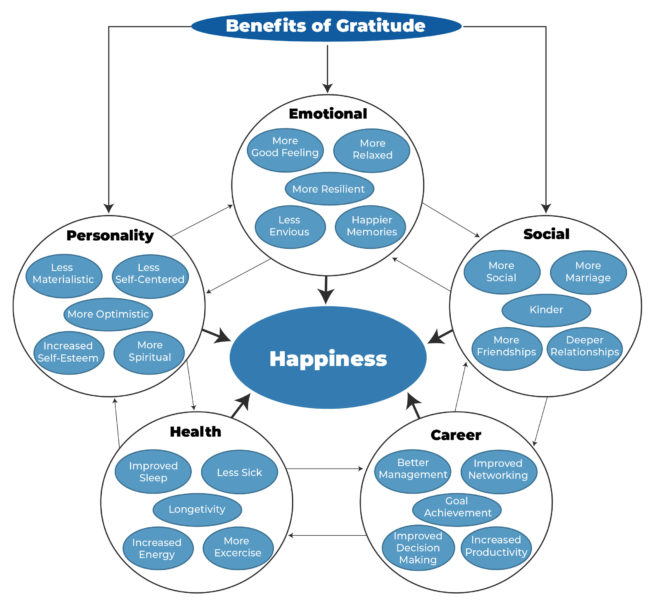
- 70% of employees would feel better about themselves if their boss were more grateful, and 81% would work harder.(source)
- 95% of employees agree that a grateful boss is more likely to be successful.
- Regular gratitude journaling has been shown to result in 5% to 15% increases in optimism and 25% increased sleep quality.
- In a study of 800 descriptive trait words, “grateful” was rated in the top 4% in terms of likability.
- 62% said that most businesses they’ve dealt with have done a good job of showing customer appreciation. (source)
- Over 90% of American teens and adults indicated that expressing gratitude made them “extremely happy” or “somewhat happy”.
- A five-minute daily gratitude journal can increase long-term well-being by 10%.(source)
- According to one study, 65% of Americans didn’t receive recognition in the workplace last year.c3 A bit more gratitude at work might be nice for us all.(source)
- 91% of respondents said they are also more likely to do business with companies that appreciate their customers. (source)
- One study from Harvard University and Wharton showed that receiving a “thank you” from a supervisor boosted productivity by more than 50 percent. Yet people are less likely to show gratitude at work than anywhere else — only 10 percent of people who express gratitude make it a daily habit at work and 60 percent of people never or rarely express gratitude at work.(source)
- One study from the University of Washington determined that when a person felt appreciated in the office, they had a higher job satisfaction and quality of life. And in another study published in the Journal of Personality and Social Psychology, researchers found that receiving a thank you note from a boss improved workers’ performances by 50 percent.(source)
- Research on gratitude and appreciation demonstrates that when employees feel valued, they have high job satisfaction, engage in productive relationships, are motivated to do their best and work towards achieving the company’s goals.(source)
- Additional research has branched out to other areas, including school curricula to improve classroom culture and experience the benefits. Even so, there’s an existence of a gratitude gap, as indicated in a 2012 national gratitude survey commissioned by the John Templeton Foundation. While 90% of respondents consider themselves grateful, only 52 percent of women and 44 percent of the men surveyed express gratitude on a regular basis.(source)
chapter 2:
Workplace Statistics
Here are statistics on gratitude and workplace satisfaction.
Use these statistics to better your work life.

- 93 percent of people agree that grateful bosses are more likely to succeed.
- 88 percent of people say that expressing gratitude to colleagues makes them feel happier and more fulfilled.
- 81 percent of people would work harder for a grateful boss.
- The No. 1 reason why people leave jobs is that they don’t feel appreciated. (source)
- Gratitude helps improve the working environment. Cultivating gratitude in the workplace plays an important role in establishing a healthy environment where employees feel happy, valued, and cared for.(source)
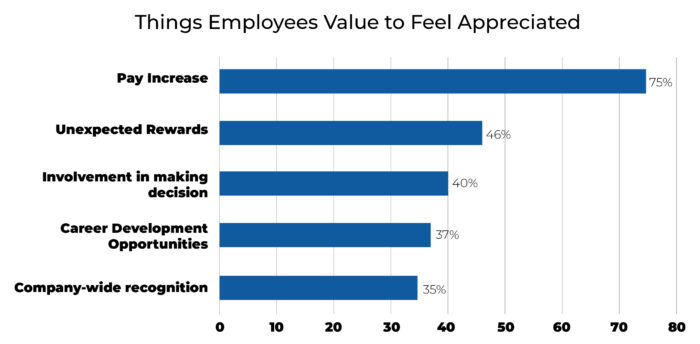
chapter 3:
Gratitude and aspects of life
Here are the statistics on the effects of gratitude on aspects of life such as spiritualism, retention, productivity, sleep, and other such aspects.
Learn how every aspect of life can be benefitted by being grateful.

- Gratitude enhances spiritualism: The majority of religions believe that gratitude is one of the most important virtues. This is because Individuals who are more spiritual also have the tendency to exhibit more grateful behavior.(source)
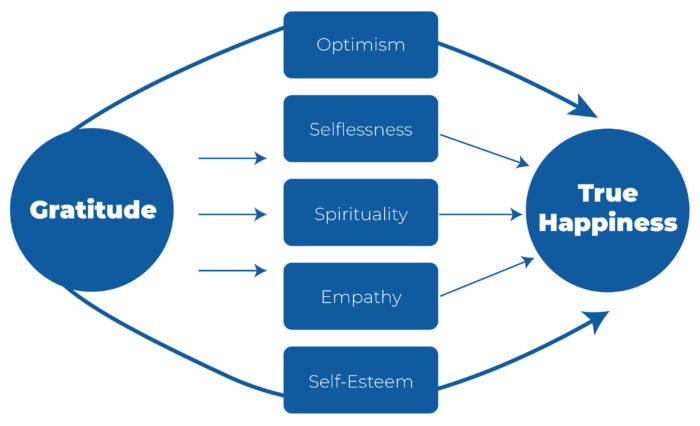
- Gratitude improves retention: A study conducted by the Glassdoor team shows that 53% of employees claim that they are willing to stay longer in a company if their boss appreciates them more (Glassdoor Team, 2019). Meanwhile, another research states that 66% of employees are willing to quit their jobs if they feel like they are not appreciated (Lipman, 2017).(source)
- Gratitude enhances productivity: According to Glassdoor’s survey, 81% or four in every five employees feel more motivated to work harder when they feel that their work is appreciated by their boss and/or employers. Meanwhile, less than 40% of employees feel that they need to work harder due to their bosses’ demands or fear of losing their jobs (Glassdoor, 2019).(source)
- Researchers at the University of Pennsylvania demonstrated that study participants who practiced gratitude were 50% more productive than those who did not. — Wharton(source)
- Grateful people sleep better: Writing in a gratitude journal improves sleep, according to a 2011 study published in Applied Psychology: Health and Well-Being. Spend just 15 minutes jotting down a few grateful sentiments before bed, and you may sleep better and longer.(source)
- In one study of 65 subjects with a chronic pain condition, those who were assigned a daily gratitude journal to be completed at night reported half an hour more sleep than the control group.(source)
- In another study of 400 healthy people, those participants who had higher scores on a gratitude test also had significantly better sleep. They reported a faster time to get to sleep, improved sleep quality, increased sleep duration, and less difficulty staying awake during the day.(source)
- One study that included over 400 adults, forty percent with sleep disorders, found that quality of sleep was greatly improved by gratitude. Thoughts of thankfulness for positive things before sleep resulted in falling asleep more quickly and for a longer period of time.(source)
- The most comprehensive research conducted on gratitude, headed by Emmons, examined the healing effects of having gratitude across three studies. One study on subjects with neuromuscular diseases showed only one area of remarkable difference compared to the control group— sleep. The subjects practicing gratitude got a half hour more of slumber than the group that didn’t.(source)
- Finally, another study observed a group of women keeping a gratitude diary. It might not come as much of a surprise that the group doing gratitude exercises had elevated optimism, improved well-being, decreased blood pressure, and better sleep quality.(source)
- Gratitude is related to a 10 percent improvement in sleep quality in patients with chronic pain, 76 percent of whom had insomnia, and 19 percent lower depression levels.(source)
- Researchers from the University of Manchester in England examined the correlation between gratitude and the thoughts before sleeping, and how these affect an individual’s sleep. Included in the study are 401 adults between 18 to 68 years old. Among the participants, 40% are recorded to have clinically impaired sleep or have sleeping disorders based on their Pittsburgh Sleep Quality Index (PSQI) score.(source)
- Spending 10 to 15 minutes each night writing down or thinking about some things or people you are grateful for can be a helpful first step in improving your quality of sleep.(source)
- Gratitude improves self-esteem: A 2014 study published in the Journal of Applied Sport Psychology found that gratitude increased athlete’s self-esteem, which is an essential component to optimal performance. Other studies have shown that gratitude reduces social comparisons.(source)
- Gratitude opens the door to more relationships. Not only does saying “thank you” constitute good manners, but showing appreciation can help you win new friends, according to a 2014 study published in Emotion. The study found that thanking a new acquaintance makes them more likely to seek an ongoing relationship(source)
- One way gratitude may spark happiness is through increased self-esteem: An October 2015 study in Personality and Individual Differences found that more gratitude correlated with having higher regard for yourself, which in turn increased feelings of wellbeing.(source)
- Gratitude improves physical health: Grateful people experience fewer aches and pains and they report feeling healthier than other people, according to a 2012 study published in Personality and Individual Differences. Not surprisingly, grateful people are also more likely to take care of their health.(source)
- Gratitude makes us healthier: According to one study published in Personality and Individual Differences, people who are appreciative experienced fewer aches and pains and reported being in better health than those who lacked gratitude.(source)
Believe it or not. Gratitude can positively affect our health in many ways. Check it out:
| Results1 | Study | Date |
| Keeping a gratitude journal caused to report 16% fewer physical symptoms, 19% more time spent exercising, 10% less physical pain, 8% more sleep and 25% increased sleep quality | Counting Blessings Versus Burdens | 2003 |
| The emotion of appreciation and gratitude shown to induce the relaxation response. | The Grateful Heart | 2004 |
| A gratitude visit reduced depressive symptoms by 35% for several weeks; a gratitude joumal lowered depressive symptoms by 30%+ for as long as the practice was continued. | Positive Psychology Progress | 2005 |
| Patients with hypertension were instructed to count their blessings once a week. There was a significant decrease in their systolic blood pressure. | Gratitude: Effects on Perspectives and Blood Pressure | 2007 |
| Gratitude correlated with improved sleep quality (r = 29), less time required to fall asleep (r =.20), and increased sleep duration (r = .14). | Gratitude Influences Sleep Through the Mechanism of Pre-Sleep Cognitions | 2009 |
| Levels of gratitude significantly correlated with vitality and energy. | Multiple Studies | Many |
- Gratitude makes us happier: A five-minute daily gratitude journal can increase your long-term well-being by more than 10 percent.a1,a2,a3 That’s the same impact as doubling your income!a4(source)
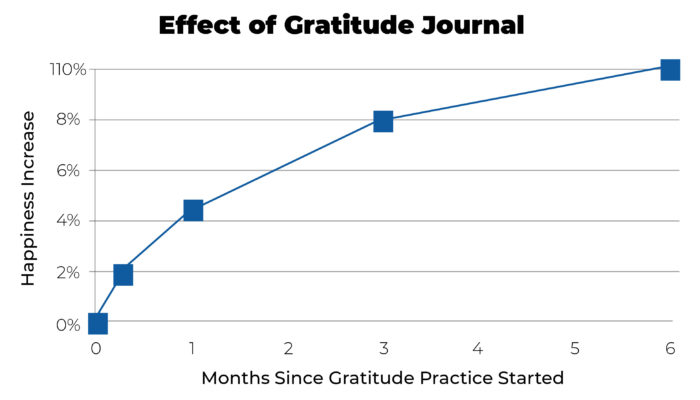
- Gratitude generates social capital – in two studies with 243 total participants, those who were 10% more grateful than average had 17.5% more social capital.(source)
- Over 90% of American teens and adults indicated that expressing gratitude made them “extremely happy” or “somewhat happy”. (source)
- Gratitude increases your energy levels:
Study of 238 people found a correlation of .46 between vitality and gratitude.e2
A study of 1662 people found a correlation of .38 between vitality and gratitude.(source)
- Gratitude makes you more likely to exercise:
In one 11-week study of 96 Americans, those who were instructed to keep a weekly gratitude journal exercised 40 minutes more per week than the control group.a2 No other study has yet to replicate these results. It could be because other gratitude studies testing this effect have been much shorter – in the range of one to three weeks, or it could be because this result was a fluke.(source)
- Gratitude makes us feel good:
Surprise, surprise: gratitude actually feels good.
Yet only 20% of Americans rate gratitude as a positive and constructive emotion (compared to 50% of Europeans).
According to gratitude researcher Robert Emmons, gratitude is just happiness that we recognize after-the-fact to have been caused by the kindness of others. Gratitude doesn’t just make us happier, it is happiness in and of itself!(source)
- Gratitude increases your goal achievement:
In one study, participants were asked to write down those goals which they wished to accomplish over the next two months. Those who were instructed to keep a gratitude journal reported more progress on achieving their goals at the end of the study. One result doesn’t make science – what you should take away from this is that, at the least, gratitude will not make you lazy and passive. It might even do the opposite(source)
- Improves mental health: One 2020 study showed that regularly practicing gratitude can help ease symptoms of anxiety and depression. An older study from 2003 noted that gratitude was linked to improved mood.(source)
- A 2003 study published in the Journal of Personality and Social Psychology found that gratitude was a major contributor to resilience following the terrorist attacks on September 11.(source)
- Gratitude reduces a multitude of toxic emotions, ranging from envy and resentment to frustration and regret. Robert A. Emmons, Ph.D., a leading gratitude researcher, has conducted multiple studies on the link between gratitude and well-being. His research confirms that gratitude effectively increases happiness and reduces depression.(source)
- Depression: Scientists studying positive psychology found that a one-time act of thoughtful gratitude produced an immediate 10% increase in happiness and 35% reduction in depressive symptoms. The happy effects disappeared within three to six months which shows that gratitude is an act to be repeated again and again.(source)
- Two gratitude activities (counting blessings and gratitude letter writing) reduced the risk of depression in at-risk patients by 41 percent over a six month period.(source)
- Keeping a gratitude diary for two weeks produced sustained reductions in perceived stress (28 percent) and depression (16 percent) in health-care practitioners.(source)
- Gratitude is related to 23 percent lower levels of stress hormones (cortisol)(source)
- Results of a study on cultivating appreciation and other positive emotions showed lower levels of stress hormones. The study found a 23% reduction in cortisol and 100 % increase in DHEA/DHEAS levels. (source)
- Hopelessness: Writing a letter of gratitude reduced feelings of hopelessness in 88% of suicidal inpatients and increased levels of optimism in 94% of them.(source)
- Diabetes: Grateful people (including people grateful to God) have between 9-13 percent lower levels of Hemoglobin A1c, a key marker of glucose control that plays a significant role in the diagnosis of diabetes.(source)
- Heart failure: Practicing gratitude even led to a 7% reduction in biomarkers of inflammation in patients with congestive heart failure.(source)
- An April 2017 study in Psychosomatic Medicine found that among people with acute coronary syndrome (a condition in which blood flow to the heart is compromised), those that reported gratitude and optimism were more likely to have better blood vessel function.(source)
- Separate research, published in a July 2016 edition of Psychosomatic Medicine, revealed that inflammatory markers were lower in heart failure patients who journaled about gratitude for eight weeks versus a control group.(source)
- Gratitude helps patients with heart illness. According to a study, the practice of gratitude contributes to reducing the biomarkers of inflammation by 7% among individuals diagnosed with congestive heart failure (UC Davis Health, 2015).(source)
- A grateful heart is a healthy one, at least according to research published in Spirituality in Clinical Practice. In the study, researchers found that gratitude reduced inflammation and produced healthier heart rhythms in patients with heart failure.(source)
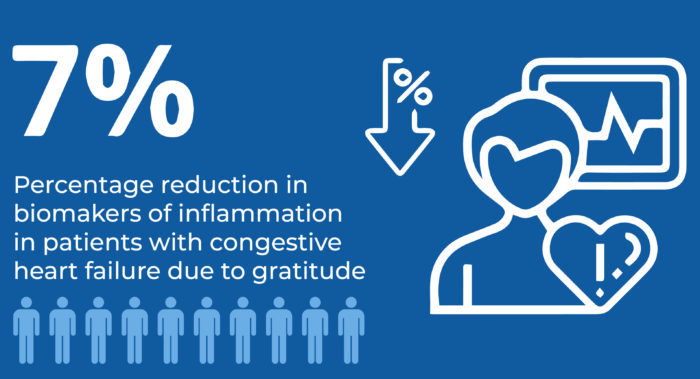
- Blood Pressure: Grateful people have 16% lower diastolic blood pressure and 10% lower systolic blood pressure compared to those less grateful.(source)
- Pandemic: Survey results reinforce why a simple “thank you” is so powerful in keeping people motivated and mitigating stress:
- 66% of employees agree or strongly agree “Giving and/or receiving a ‘thank you’ during the pandemic has made me feel more connected to my colleagues.”
- 64% of employees agree or strongly agree “Giving and/or receiving a ‘thank you’ during the pandemic motivated me to work harder.”
- 61% of employees agree or strongly agree “Giving and/or receiving a ‘thank you’ during the pandemic has helped ease the stress of working remotely.”
- 54% of employees agree or strongly agree “Giving and/or receiving a ‘thank you’ during the pandemic has helped ease anxiety associated with the COVID-19 lockdown.”(source)
- The Gratitude Gap in the Workplace:
One study found that while about half of people regularly say thank you to their family members, only about 15% of people regularly say thank you at work. The same study found that 35% of people say that their managers have never thanked them. This muted expression of gratitude in the workplace compared to other contexts can be thought of as the “gratitude gap.”(source)
- Recovery: Research shows that “putting a little gratitude in your attitude” can be helpful for those recovering from substance abuse. One reason this may be? Practicing gratitude can help a person unearth alternative coping strategies, according to a July 2017 Substance Use & Misuse study.(source)
- Gratitude extends the lifespan: As a positive emotion, gratitude improves an individual’s overall well-being. An example of this is how gratitude enhances optimism, which then combats the health hazards brought by fostering a pessimistic outlook in life (Boyles, 2009). According to a medical study that focuses on the risk of developing heart disease and risk for death among women, participants who scored high in optimism only had a 9% risk of developing heart illness. Optimistic women also scored 14% lower risk of dying compared to women who scored high in cynicism and hostility.(source)
- Gratitude boosts self-confidence: A study that focuses on athletes shows that the participants with high levels of gratitude received from their coaches also experienced an increase in self-esteem over the period of six months the research was conducted (Chen and Wu, 2014, pp. 349-362).(source)
- Gratitude extends the lifespan: As a positive emotion, gratitude improves an individual’s overall well-being. An example of this is how gratitude enhances optimism, which then combats the health hazards brought by fostering a pessimistic outlook in life (Boyles, 2009). According to a medical study that focuses on the risk of developing heart disease and risk for death among women, participants who scored high in optimism only had a 9% risk of developing heart illness. Optimistic women also scored 14% lower risk of dying compared to women who scored high in cynicism and hostility.(source)
- Gratitude helps keep glucose levels under control. Practicing gratitude has led to lower levels of Hemoglobin A1c, which is a glucose control indicator that helps in the diagnosis of diabetes. According to this study, grateful individuals have been reported to have their Hemoglobin A1c levels decrease by 9-13%.(source)
- Gratitude improves pain tolerance: Studies show that the daily practice of gratitude helps lessen an individual’s sensitivity to pain (The Sports & Spinal Group, 2020). According to Bruce F. Singer, a psychologist and founding director of the Chronic Pain and Recovery Center, the practice of gratitude may not completely eliminate chronic pain, but it can be an effective pain management tool as it helps shift the focus away from the physical pain and to the more positive things instead.(source)
- Giving gratitude letters or notes: Writing a letter of gratitude or even a thank you note to at least one person a week helps significantly improve mental health. This has been proven by a study that involved around 300 adults, all of whom were going through mental health counseling (Wong and Brown, 2018). Writing gratitude letters or notes for the people who have become your source of inspiration has also shown to increase levels of happiness and gratefulness (Oppland, 2020). In a survey by a market research company, it shows that sending appreciation in written form is still very much alive.(source)
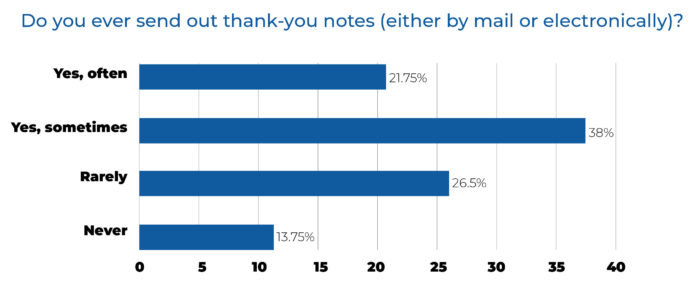
- Women are more grateful than men: A national survey on gratitude, which polled over 2,000 Americans, found that women tend to be more grateful than men. This confirms the findings from another study, which found that American men are particularly uncomfortable expressing gratitude (compared to women and compared to Germans). The Youth Gratitude Project also found that girls are more grateful than boys, suggesting that the difference starts early.(source)
- People are less likely to express gratitude at work than anywhere else:
That same national survey found that work is the last place you’re likely to hear gratitude. Only 10% of people say thank you to their colleagues on any given day, and 60% of people never express gratitude at work(source)
- Cholesterol: UC San Francisco professor Wendy Berry Mendes is investigating the health effects of gratitude, and her preliminary findings show that grateful people have higher good cholesterol and lower bad cholesterol, as well as lower blood pressure. One of the reasons for this might be gratitude’s effect on stress.(source)
- Grateful people spend more time exercising: More grateful people – who see their health as a blessing or a gift – may take better care of themselves. In one study by professors Robert Emmons and Mike McCullough, people were asked to list five things they were grateful for once a week for 10 weeks. Among a host of other benefits, they spent more time exercising than a control group.(source)
- Gratitude could help you achieve your goals: In one six-week study, people doing a gratitude exercise worked harder at their goals and made 20% more progress toward them. This might be because gratitude makes us more energetic.(source)
- Post-traumatic stress disorder: Resilience is a key component of our mental well-being and gratitude could play a role here too. As well as reducing stress, gratitude may help us overcome trauma. A 2006 study published in Behaviour Research and Therapy found that war veterans who felt higher levels of gratitude experienced lower rates of post-traumatic stress disorder.(source)
- Recently published, the Journal of Research in Personality examined gratitude and grit to confer resiliency to suicide by increasing meaning in life.(source)
- Improve Relationship: Practicing gratitude has a ripple effect and impacts those around us. A 2013 study by Algoe, Fredrickson and Gable found that by expressing gratitude to our partners, we improve the quality of our relationship. (source)
- A 2011 study by Lambert and Fincham discovered that those who communicate their gratitude with friends are more likely to talk through any concerns or problems they come up against and have a more positive perception of their friends. (source)
- Not only does saying “thank you” constitute good manners, but showing appreciation can help you win new friends, according to a 2014 study published in Emotion. The study found that thanking a new acquaintance makes them more likely to seek an ongoing relationship.(source)
chapter 4:
Gratitude and having a better life
Here are statistics on gratitude and having a better life.
Learn the effects of gratitude on aggression, motivation, culture, brain, and much more.

- Aggression: Gratitude also reduces aggression, according to a study by the University of Kentucky. Participants who practiced gratitude were more sensitive toward others and less likely to seek revenge or retaliation when given negative feedback.(source)
- Appreciation is a much better motivator: A study by Glassdoor found that 80% of employees would be willing to work harder for an appreciative boss, and 70% said they’d feel better about themselves and their efforts if their boss thanked them more regularly.(source)
- According to a pair of US psychologists, a common failure of perspective means that a lot of us underestimate the positive impact on others (and ourselves) of expressing gratitude, meaning that we miss out on a simple way to improve our social relations and wellbeing. Based on their series of experiments in Psychological Science, Amit Kumar at the University of Texas at Austin and Nicholas Epley at Booth School of Business at the University of Chicago conclude that “expressing gratitude might not buy everything, but it may buy more than people seem to expect”.(source)
- Risk of Suicide: In recent studies conducted in 2020, data examining the practice of gratitude among college students supported the hypothesis that gratitude is linked to a reduced risk of suicide.(source)
- Journaling in a gratitude diary has shown to reduce depression and anxiety, while increasing optimism among suicidal inpatients. Some researchers argue that gratitude is a low-cost, high-impact mental health tool with protective benefits against suicide.(source)
- Earlier this year, a study found that keeping a gratitude journal decreased materialism and bolstered generosity among adolescents. In another study from August, high school students who were asked to keep gratitude journals also reported healthier eating. There’s also some evidence it could lower your risk of heart disease and lower symptoms of depression for some people.(source)
- Study participants who referred to themselves as “very happy” ended up with incomes 10% higher than the average of people in the study. — Wharton(source)
- It makes you appreciate you for who you are: One study from Bina Nusantara University in Indonesia found that the more grateful a person is, the less they compare themselves to others and the more satisfied with their own lives they are.(source)
- One study out of the Queensland University of Technology found that when retailers expressed gratitude toward their customers, the consumers were more likely to remain loyal to that business and continue shopping there.(source)
- It makes you less materialistic: According to researchers from the University of Miami, gratitude “may obviate the need for materialistic striving as a way of coping with existential insecurity” by making one’s outlook on life more positive.(source)
- When people are in a good mood, they are also more likely to put their faith in others. And similarly, one study published in the Journal of Personality and Social Psychology concluded that gratitude—another emotion with “positive valence”—increases a person’s tendency to trust.(source)
- One study published in the Journal of Happiness Studies found that people who are grateful have higher grade point averages, plus are less depressed and jealous of others.(source)
- In a survey on gratitude in adult professionals, British psychologist and wellness expert Robert Holden found that 65 out of 100 people selected happiness over health, although they indicated that both were equally important for a good life.(source)
- Culture: Gratitude was significant in ancient philosophies and cultures, for example, in the Roman culture, where Cicero mentioned gratitude as the ‘mother’ of all human feelings. As an area of neuropsychological research, however, it was a rare subject of concern until the last two decades (Emmons & McCullough, 2004).(source)
- Gratitude And The Brain: Neural mechanisms that are responsible for feelings of gratitude have grabbed attention (Wood, Maltby, Stewart, Linley, & Joseph, 2008). Studies have demonstrated that at the brain level, moral judgments involving feelings of gratefulness are evoked in the right anterior temporal cortex (Zahn et al., 2009).(source)
- In the same study, it was revealed that the reason why some of us are naturally more grateful than others, is the neurochemical differences at the Central Nervous System. People who express and feel gratitude have a higher volume of grey matter in the right inferior temporal gyrus (Zahn, Garrido, Moll, & Grafman, 2014).(source)
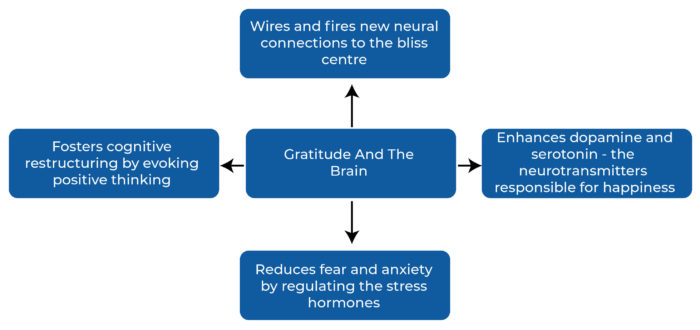
- Gratitude And Social Psychology: Gratitude has a social aspect to it that argues it to be a socially driven emotion. Social psychologists believe it to be entwined with the perception of what we have done for others and what others have done for us (Emmons & McNamara, 2006).(source)
- According to them, gratitude is an emotion that directly targets at building and sustaining social bondings (Algoe, Haidt, & Gable, 2008) and reinforce prosocial responses in the future (McCullough, Kimeldorf, & Cohen, 2008).(source)
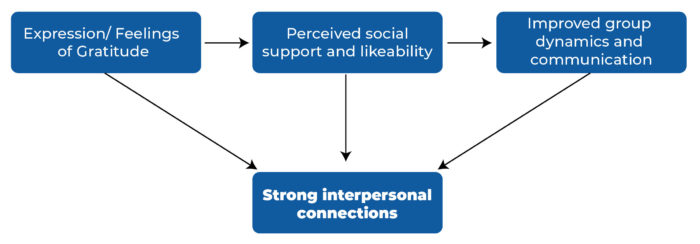
- How to teach gratitude to children: Research tells us that when children under the age of six receive things, they only express gratitude about 20% of the time. They do get better though, so don’t despair! By the time children are around 10 years old, this number rises to about 80% of the time.(source)
Conclusion
Hope these 102 statistics on gratitude helped you and motivated you to be even more grateful than before.
Let me know if you have any questions or any pointers we might have missed. We will be grateful for it!
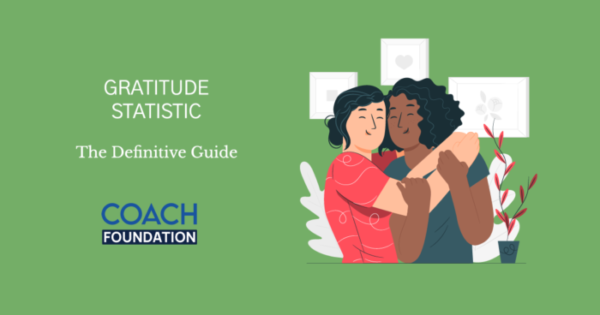










Hello coachfoundation.com owner, Thanks for the well-researched and well-written post!